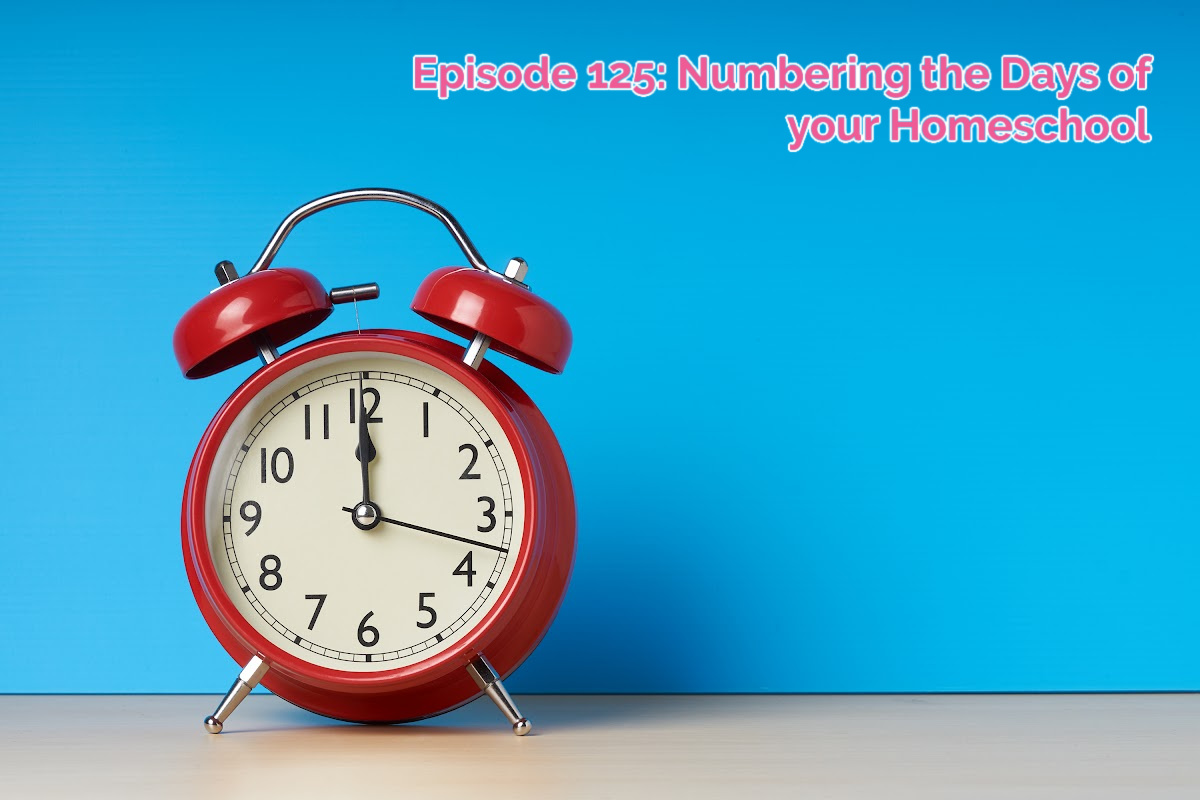SS #125 – Numbering the Days of Your Homeschool
“Teach us to number our days that we may gain a heart of wisdom.” -Psalm 90
It is not only our own personal lifespan that is numbered, but even more limited are the days we actually homeschool.
Today we have the first of two summer episodes on our October 7 retreat topic: Time! What is it and why is it so difficult to relate to it calmly and fruitfully?
Join us October 7 for a full day discussion of the practical side of investing our time in our children as we educate them. Click here to find the details.

Listen to the podcast:
TUNE IN:
Apple Podcasts | Spotify | Stitcher
Time management for homeschooling
Today’s Hosts

Mystie Winckler, second-generation homeschool mom of 5 (including 2 graduates),
doesn’t want to follow dumb rules constraining her time.

Abby Wahl, homeschooling mom of 5 (including 1 graduate), knows how to work hard and leisure hard.
“The point is very simple: in order to create time to pray, we must destroy time to do something else.”
Peter Kreeft, “Time”
Homeschooling takes time.
It’s alarming but true: If you don’t take time to homeschool, you’re not homeschooling. Homeschooling takes a significant chunk of time, and when we’re tempted to resent that reality, we’re wanting the world to work differently than God created it.
So we have to orient ourselves to time properly to use it well and to understand why we are responsible to use it well.
See then that ye walk circumspectly, not as fools, but as wise, redeeming the time, because the days are evil.”
Ephesians 5:15-16
What is time?
Time is a gift God gives us.
Time is a part of creation. It is one of the constraints within which God superintends His world. He created us to function within time, but He Himself is outside of time.
Eternity is existing outside of time – so someday we, too, will live without time constraints, but that day is not this day. During our life, God gives us time and commands us to invest it as the servants given talents – some get more, some get less, but all can make much of what they’re given if they don’t hide it away for themselves because they’re afraid of risk.
How do we use time well?
It takes wisdom to use time well, but using time well also imparts wisdom.
Existing in and investing of time takes attention and intentionality.
It is good for us to be aware of our finiteness and mortality. We are not in control of our life, of our time – our worry and care never adds one day to our life.
A protection against evil
We all have many temptations we are prone to, but being charged to make the most of the time we are given is one protection God has ordained for us. “Idle hands are the devil’s plaything,” as they say – and it’s true. We are not to be idle. Time is not our own, because we were bought with a price.
When we occupy ourselves with an abundance of good things, we can live in self-forgetfulness and make smaller spaces for temptation to get a foothold in our lives.
Now we commend you, brothers, in the name of our Lord Jesus Christ, that you keep away from any brother who is walking in idleness and not in accord with the tradition that you received from us. For you yourselves know how you ought to imitate us, because we were not idle when we were with you, nor did we eat anyone’s bread without paying for it, but with toil and labor we worked night and day, that we might not be a burden to any of you. It was not because we do not have that right, but to give you in ourselves an example to imitate.
For even when we were with you, we would give you this command: If anyone is not willing to work, let him not eat. For we hear that some among you walk in idleness, not busy at work, but busybodies. Now such persons we command and encourage in the Lord Jesus Christ to do their work quietly and to earn their own living.
As for you, brothers, do not grow weary in doing good.
2 Thessalonians 3:6-13
The ditch on either side of the road.
Aristotle’s concept of the golden mean reminds us that there’s always a vice on either side of the right path. We’re always tempted to careen from one extreme to the other rather than follow the straight and narrow.
One ditch when it comes to using our time well is being utilitarian, believing we’re supposed to squeeze as much usefulness out of every minute – and each minute is wasted that is not spent in manual or paid work. This is a materialist temptation because all spiritual perspective is overshadowed by earthly cares.
We were created for work and for worship, for labor and for festival. We were created to enjoy God forever, and that begins now – we were not created to be worker bees.
The other ditch, however, is hedonism and antinomianism. The question becomes not “What does God want me to do with my time?” but rather “What do I want to do with my time?” and we try to minimize anything in our life that we don’t like. Our desire becomes our measure. Instead, however, we should transform our desire to conform to the measure, the standard, of God’s design and desires.
Rejecting materialist views of time
Because time is a construct not of our own but of God’s making, He operates outside it while we cannot (yet). So it only makes sense to dedicate the first-fruits of our time to God in prayer, because He is capable of magnifying and multiplying in ways we can’t comprehend.
When we are harried and hassled and neglectful of our first duty to worship and trust, we should not be surprised that our time slips through our fingers to we know not where.
When we wonder how we should spend our time, our first, go-to answer ought always to be prayer. God gives wisdom – which we need for time management – to those who ask for it. And one way He then gives wisdom is by giving us the opportunity to be fruitfully busy with our time.
I have so much business I cannot get on without spending three hours daily in prayer.
Martin Luther
Mentioned in the Episode

Listen to related episodes:
SS #131 – Outsourcing in High School (with Jami Marstall!!)
SS #124 – Redeeming the 5-Paragraph Essay with Renee Shepard
SS #120 – Let Them Go: Parenting Teens (with Pastor Toby Sumpter!!)
SS #88: Transitioning Kids to Independent Work









